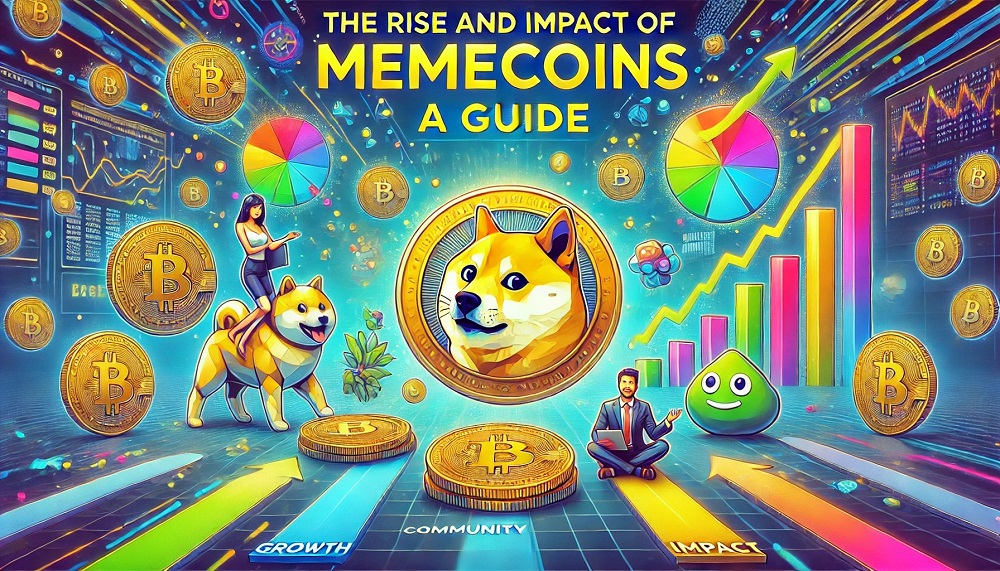By blending humor, viral internet culture, and digital finance, memecoins have become a fascinating trend in the crypto sector lately. The essential features of memecoins, their differences from traditional cryptocurrencies, and the part social media and influencers have in their emergence are explored in this guide.
What are Memecoins?
Memecoins are a subset of cryptocurrencies mostly motivated by online memes and viral phenomena. Their value often depends more on the popularity of these memes than on any basic technological or financial principle. A younger, internet-savvy audience finds them appealing because of their catchy names and humorous themes.
Key Features of Memecoins
Memecoins possess some distinct characteristics.
A Blend of Humor and Culture
Usually referencing popular internet memes and cultural events, memecoins can be fun and exciting. For individuals who use social media actively, this makes them instantly identifiable and relatable.
Community-Driven
The power and passion of their communities primarily determine how successful memecoins are. Often active on social media, these groups post information, memes, and investment tips.
Extreme Volatility
Social media trends and public sentiments cause their prices to swing dramatically.
Large Supplies
Many memecoins create a sense of affordability by having an incredibly immense or limitless supply. This can draw in investors hoping to get large amounts of tokens at cheap prices.
Differences Between Memecoins and Traditional Cryptocurrencies
Memecoins and Traditional cryptocurrencies have some similar characteristics. Such similar features are transparency, decentralization, and security.
Both are also useful for digital transactions, including purchasing, selling, and trading. However, their core blockchain technology is the same, memecoins and traditional cryptocurrencies differ in many other respects.
Technical Foundation
Strong technical and financial bases support conventional cryptocurrencies like Bitcoin and Ethereum. They have detailed whitepapers, established protocols, and focused development teams. By contrast, memecoins are produced mainly as jokes or social experiments and typically lack these technological foundations.
Use Cases
Traditional cryptocurrencies have clearly defined use cases ranging from decentralized means of exchange and smart contract facilitation to decentralized application-enabling capabilities. Conversely, memecoins are driven chiefly by trends and speculation and usually begin with little practical value.
Institutional Support
Institutions, businesses, and notable developers include cryptocurrencies in the real economy to support traditional cryptocurrencies. However, memecoins lack such support and are fueled by community enthusiasm and social media impact.
How Memecoins Work
The tokenomics of memecoins depend on supply systems. For instance, Shiba Inu, a prominent memecoin, has a maximum supply of 999.98 trillion tokens.
Some memecoins, including Dogecoin, however, have no limited supply, which causes ongoing inflation and possible long-term value loss. However, volatility is a factor no memecoin ecosystem can ignore since the value of meme currencies is mainly influenced by speculation, market attitude, and trends on social media.
Furthermore, some memecoins like Shiba Inu use deflationary strategies like “token burning,” in which tokens are permanently taken out of circulation to counter volatility and trigger scarcity. Like conventional cryptocurrencies, memecoins are sometimes issued via mining, airdrops, and initial coin offers (ICOs).
The Role of Social Media in Memecoin Popularity
Memecoins have emerged, thanks in great part to social media platforms. They are the primary tools for disseminating information, generating buzz, and promoting adoption. Here are some major platforms.
Memecoins have received massive adoptions and conversations in subreddits like r/CryptoCurrency and r/SatoshiStreetBets. Memes, investment advice, and project updates shared by these networks usually help explain memecoins viral character.
X, Formerly Twitter
Crypto enthusiasts and influencers’ tweets and retweets help increase the appeal of memecoins. Prominent people like Elon Musk have shown how much their social media activity can affect the memecoin markets.
Telegram
Many memecoin projects prefer Telegram for creating robust communities. It allows owners to control engagement, share updates, respond to queries, and have direct contact with followers.
TikTok
Though not as central as other platforms, TikTok has helped memecoin virality by means of short, funny videos produced by influencers aimed at younger audiences.
How Influencers Impact Memecoins
The ecosystem of memecoins depends much on influencers. Public attitudes and market dynamics can be changed significantly by their thoughts.
Arthur Hayes
The co-founder of BitMEX argues against discounting memecoins as useless. He believes they draw interest and fresh users to blockchain networks, adding value to such memecoin ecosystems.
Vitalik Buterin
Less excited about memecoins, the Ethereum co-founder opines that they lack of practical use. Therefore, he suggests ideas like “charity coins” for ways to make them valuable or helpful.
Final Thoughts
Memecoins offer a wonderful fusion of online culture, humor, and finance. Their ascent is evidence of the force of community-driven investment and social media.
Although their technical bases and use applications differ significantly from those of conventional cryptocurrencies, their popularity emphasizes the changing scene of digital finance. Considering their significant volatility and speculative character, investors should approach memecoins with caution.
